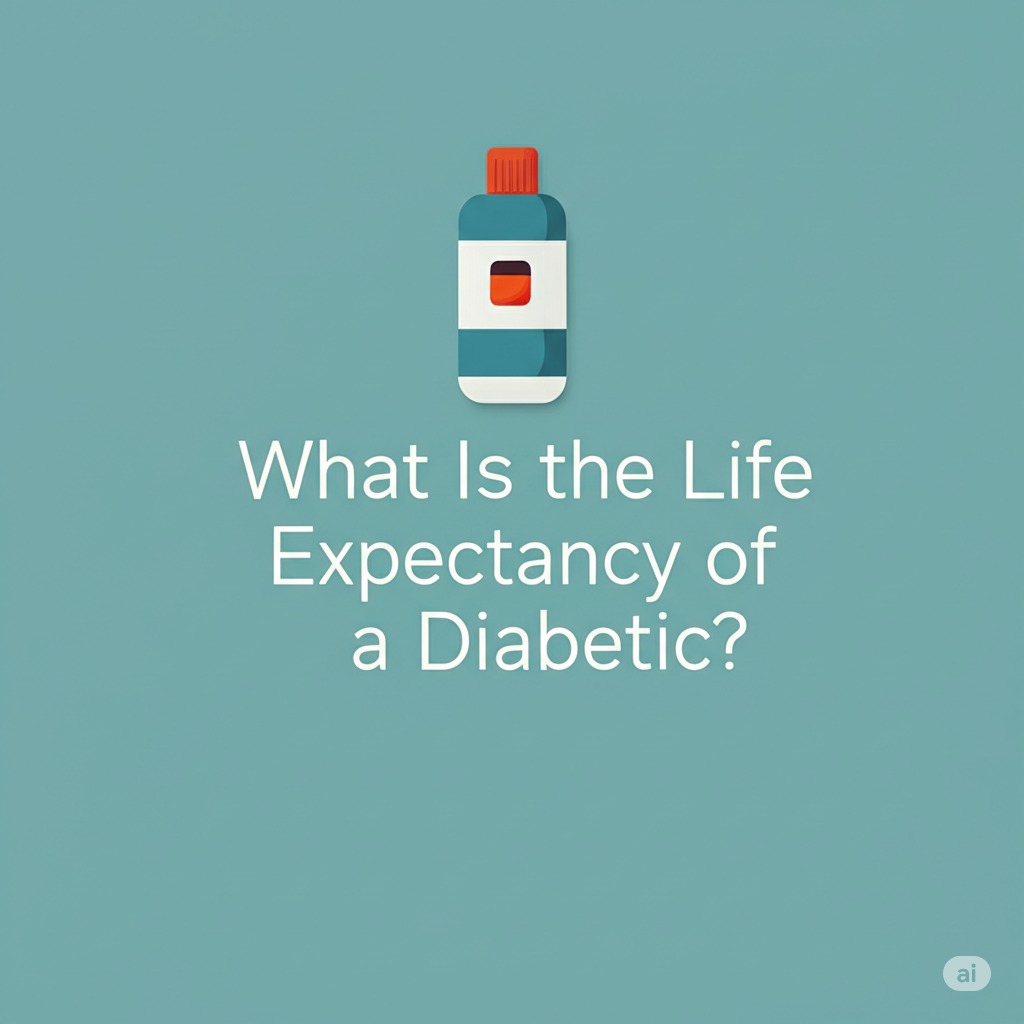Diabetes is one of the most common health conditions in the world. Millions of people live with it every day. But if you or someone you love has diabetes, you might be asking: What is the life expectancy of a diabetic? That’s a fair and important question.
The short answer? It depends. Some people with diabetes live long, healthy lives. Others may face serious complications that shorten their lifespan. The good news is that many of the factors affecting life expectancy are within your control.
In this article, we’ll break down everything you need to know about diabetes and life expectancy in simple, clear language. We’ll cover:
- The difference between type 1 and type 2 diabetes
- How each type affects how long you might live
- What factors can shorten or extend life with diabetes
- Real-life examples and studies
- Steps you can take to live longer and healthier
What Is Diabetes?
Before we talk about life expectancy, let’s make sure we understand what diabetes actually is.
Diabetes is a long-term (chronic) condition that affects how your body turns food into energy. When you eat, your body breaks down food into sugar (also called glucose). That sugar enters your bloodstream. In response, your pancreas releases insulin—a hormone that helps sugar move from your blood into your cells, where it’s used for energy.
But with diabetes, this system doesn’t work properly.
There are two main types: type 1 and type 2 diabetes. Let’s look at each one.
Type 1 Diabetes: The Body Stops Making Insulin
Type 1 diabetes usually starts in childhood or young adulthood, but it can happen at any age. In this type, the immune system attacks and destroys the insulin-producing cells in the pancreas. That means the body makes little or no insulin.
People with type 1 diabetes must take insulin every day to survive—either through injections or an insulin pump.
Type 1 is not caused by diet or lifestyle. It’s an autoimmune condition, meaning the body attacks itself by mistake.
Type 2 Diabetes: The Body Can’t Use Insulin Well
Type 2 diabetes is more common. It usually develops in adults over 45, but it’s becoming more common in younger people, even children.
In type 2, the body still makes insulin, but it doesn’t use it properly. This is called insulin resistance. Over time, the pancreas can’t keep up with the demand, and insulin levels drop.
Type 2 diabetes is often linked to lifestyle factors like being overweight, lack of physical activity, and poor diet. But genetics and family history also play a big role.
What Is the Life Expectancy of a Diabetic?
Now, let’s get to the heart of the matter: How long can a person with diabetes expect to live?
There’s no single answer. Life expectancy varies widely based on the type of diabetes, how well it’s managed, age at diagnosis, and other health factors.
But research gives us some general estimates.
Life Expectancy for Type 1 Diabetes
People with type 1 diabetes tend to have a shorter life expectancy than those without diabetes. However, the gap has been shrinking over the years thanks to better treatments and technology.
According to a 30-year study from the University of Pittsburgh, people with type 1 diabetes born after 1965 had a life expectancy of around 69 years. That’s up from earlier generations, where many didn’t live past 50.
More recent data from the UK’s Office for National Statistics (2018) found that people with type 1 diabetes may lose about 13 years of life compared to those without diabetes.
For example:
- Average life expectancy for men without diabetes: ~77 years
- Average life expectancy for men with type 1: ~64 years
- Women without diabetes: ~81 years
- Women with type 1: ~68 years
But again—these are averages. Many people with type 1 diabetes live into their 70s, 80s, and beyond, especially with good care.
Life Expectancy for Type 2 Diabetes
Type 2 diabetes is more common and often diagnosed later in life. Because of that, the impact on life expectancy can be different.
A large study published in The Lancet found that type 2 diabetes can reduce life expectancy by up to 10 years, depending on when it’s diagnosed.
Here’s a rough estimate:
- If diagnosed at age 50, life expectancy may be shortened by about 6 years
- If diagnosed at age 80, the impact is much smaller—maybe only 1–2 years
Why? Because other age-related health issues often play a bigger role later in life.
But the earlier you get type 2 diabetes, the greater the long-term risk.
For example, someone diagnosed with type 2 at age 30 could lose 14–16 years of life if the condition isn’t well managed.
What Factors Affect Life Expectancy in Diabetics?
Not everyone with diabetes has the same outcome. Some live long, healthy lives. Others face serious complications early.
Why the difference?
It comes down to several key factors.
Blood Sugar Control (HbA1c Levels)
One of the most important things that affects how long you live with diabetes is how well you control your blood sugar.
Your doctor measures this using a test called HbA1c (also called A1C). It shows your average blood sugar level over the past 2–3 months.
- A1C below 5.7% = normal
- 5.7% to 6.4% = prediabetes
- 6.5% or higher = diabetes
For most people with diabetes, the goal is to keep A1C below 7%.
Why does this matter?
High blood sugar over time damages blood vessels and nerves. This leads to complications like heart disease, kidney failure, and vision loss—all of which can shorten life.
Studies show that keeping A1C under 7% can reduce the risk of complications by up to 60%.
Managing Blood Pressure and Cholesterol
Diabetes doesn’t just affect blood sugar. It also increases the risk of heart disease and stroke.
That’s why controlling blood pressure and cholesterol is just as important.
- Healthy blood pressure: below 120/80 mm Hg
- LDL (“bad”) cholesterol: below 100 mg/dL (lower for high-risk patients)
People with diabetes who also have high blood pressure or high cholesterol are at much greater risk of early death—especially from heart attacks or strokes.
Taking medications like statins (for cholesterol) and blood pressure drugs can greatly improve long-term survival.
Avoiding Smoking
Smoking is dangerous for everyone—but especially for people with diabetes.
Smoking damages blood vessels, raises blood pressure, and makes insulin resistance worse. It also greatly increases the risk of heart disease, kidney disease, and foot problems.
Quitting smoking can add years to your life, even if you’ve been smoking for decades.
The CDC says that people with diabetes who quit smoking reduce their risk of heart disease by up to 50% within just one year.
Staying Active and Eating Well
What you eat and how much you move your body play a huge role in how long you live with diabetes.
Regular physical activity helps lower blood sugar, improves heart health, and helps with weight control.
The American Diabetes Association recommends:
- At least 150 minutes of moderate exercise per week (like brisk walking)
- Strength training 2–3 times per week
Eating a balanced diet rich in vegetables, whole grains, lean proteins, and healthy fats can help manage blood sugar and reduce complications.
Diets like the Mediterranean diet and DASH diet have been shown to improve outcomes in people with diabetes.
Getting Regular Check-Ups
One of the biggest dangers of diabetes is that it can damage your body slowly—without obvious symptoms.
That’s why regular check-ups are so important.
You should have:
- A1C tests every 3–6 months
- Kidney function tests (urine and blood) yearly
- Eye exams (to check for diabetic retinopathy) yearly
- Foot exams (to catch nerve damage or sores) at every visit
Catching problems early can prevent serious complications and help you live longer.
Can You Live a Normal Life with Diabetes?
Yes—absolutely.
While diabetes can shorten life expectancy on average, many people with diabetes live long, full, and active lives.
The key is management.
With the right care, support, and lifestyle choices, you can reduce your risk of complications and live just as long as someone without diabetes.
Real-Life Examples
Take the story of Sergey Filimonov, a man with type 1 diabetes who lived to be 96 years old. He was diagnosed in 1945 and managed his condition carefully for over 70 years.
Or consider Robert “Bob” Krause, who lived to 90 with type 1 diabetes. He followed a strict routine, monitored his blood sugar, and stayed active.
These are not miracles. They are proof that good diabetes management works.
Even with type 2 diabetes, people like Halle Berry and Tom Hanks continue to live active, public lives—showing that diabetes doesn’t have to define you.
How Can You Increase Your Life Expectancy with Diabetes?
You’re not stuck with the average numbers. You can beat the odds.
Here are 7 proven ways to live longer with diabetes.
1. Keep Your Blood Sugar in Check
This is the most important step.
Work with your doctor to set a target A1C and monitor your blood sugar regularly.
Use tools like:
- Blood glucose meters
- Continuous glucose monitors (CGMs)
- Insulin pumps (for type 1 or advanced type 2)
The closer you keep your blood sugar to normal, the lower your risk of complications.
2. Take Your Medications as Prescribed
Whether you take insulin, metformin, or other diabetes drugs, take them exactly as directed.
Skipping doses or changing your plan without talking to your doctor can lead to dangerous highs or lows in blood sugar.
If cost or side effects are a problem, talk to your doctor. There are often alternatives.
3. Eat a Diabetes-Friendly Diet
You don’t need a perfect diet—just a smart one.
Focus on:
- Non-starchy vegetables (broccoli, spinach, peppers)
- Lean proteins (chicken, fish, beans)
- Whole grains (oats, quinoa, brown rice)
- Healthy fats (avocados, nuts, olive oil)
Limit:
- Sugary drinks (soda, juice)
- Refined carbs (white bread, pastries)
- Processed foods (chips, fast food)
Small changes add up. For example, swapping soda for water can lower your A1C by 0.5–1% over time.
4. Stay Physically Active
You don’t need to run marathons. Just move more.
Try:
- Walking 30 minutes a day
- Swimming or cycling
- Dancing, gardening, or housework
Exercise helps your body use insulin better and lowers blood sugar.
Even a 10-minute walk after meals can make a difference.
5. Maintain a Healthy Weight
Being overweight makes insulin resistance worse, especially in type 2 diabetes.
Losing just 5–10% of your body weight can improve blood sugar, blood pressure, and cholesterol.
For a 200-pound person, that’s only 10–20 pounds.
Work with a dietitian or doctor to create a safe weight-loss plan.
6. Manage Stress and Sleep Well
Stress and poor sleep can raise blood sugar.
When you’re stressed, your body releases hormones like cortisol that make blood sugar go up.
Lack of sleep does the same thing.
To help:
- Practice relaxation techniques (deep breathing, meditation)
- Get 7–8 hours of sleep per night
- Stick to a bedtime routine
Better sleep and less stress mean better blood sugar control.
7. Build a Support System
Living with diabetes can be tough. You don’t have to do it alone.
Talk to:
- Your doctor and diabetes care team
- Family and friends
- Support groups (online or in person)
Sharing your struggles and successes can help you stay on track.
Does Insulin Affect Life Expectancy?
Some people worry that taking insulin means their diabetes is “bad” or that it will shorten their life.
That’s not true.
Insulin is a life-saving treatment. For people with type 1 diabetes, it’s essential. Without it, they can’t survive.
For people with type 2 diabetes, needing insulin doesn’t mean failure. It often means the pancreas can’t keep up anymore—which is a natural part of the disease for many.
Using insulin properly can actually extend life by preventing high blood sugar and complications.
The key is to use it correctly and monitor for low blood sugar (hypoglycemia), which can be dangerous if not treated.
How Do Complications Affect Life Expectancy?
The main reason diabetes can shorten life is because of long-term complications.
When blood sugar stays high for years, it damages blood vessels and nerves throughout the body.
Here are the most common complications and how they affect lifespan.
Heart Disease and Stroke
Heart disease is the #1 cause of death in people with diabetes.
People with diabetes are 2–4 times more likely to have heart disease or a stroke.
High blood sugar damages the heart and blood vessels. It also makes plaque build up in arteries faster.
But the risk can be reduced with:
- Blood pressure control
- Cholesterol-lowering drugs
- Aspirin (if recommended by your doctor)
- Healthy lifestyle
Kidney Disease (Diabetic Nephropathy)
High blood sugar can damage the kidneys over time.
About 1 in 3 people with diabetes develop kidney disease.
If it gets worse, it can lead to kidney failure, which requires dialysis or a transplant.
Kidney disease increases the risk of early death.
But early detection and treatment can slow or stop the damage.
Nerve Damage (Neuropathy)
Nerve damage from diabetes often affects the feet and legs.
Symptoms include:
- Tingling
- Numbness
- Pain
- Burning
Severe nerve damage can lead to foot ulcers and infections. In some cases, it leads to amputation.
Taking care of your feet every day—checking for cuts, wearing good shoes, seeing a podiatrist—can prevent serious problems.
Vision Loss (Diabetic Retinopathy)
Diabetes is the leading cause of blindness in adults.
High blood sugar damages the tiny blood vessels in the eyes.
Over time, this can cause blurry vision, floaters, and even total vision loss.
But regular eye exams and good blood sugar control can prevent most vision problems.
Other Complications
Diabetes also increases the risk of:
- Gum disease
- Skin infections
- Digestive problems (gastroparesis)
- Sexual dysfunction
All of these can affect quality of life and, in some cases, lifespan.
But again—most are preventable with good management.
Does Age at Diagnosis Matter?
Yes—when you’re diagnosed with diabetes makes a big difference in how it affects your life.
Diagnosed Young (Under 40)
If you get diabetes at a young age, you have more years of exposure to high blood sugar. That means a higher risk of complications over time.
For example, someone diagnosed with type 2 diabetes at 35 may face heart or kidney problems by 50 if not well managed.
But starting treatment early and living a healthy lifestyle can greatly reduce these risks.
Diagnosed Later (Over 60)
Older adults with diabetes often have other health issues like high blood pressure or arthritis.
In this group, diabetes may not shorten life as much because other conditions play a bigger role.
But it’s still important to manage blood sugar to avoid complications like falls, infections, or hospital stays.
Can You Reverse Type 2 Diabetes?
You can’t “cure” diabetes, but some people with type 2 can achieve remission.
Remission means your blood sugar levels return to normal without medication.
This usually happens with:
- Major weight loss (especially after bariatric surgery)
- Intensive lifestyle changes (diet and exercise)
A UK study called DiRECT showed that nearly half of people with type 2 diabetes who lost 15 kg (33 lbs) or more went into remission after one year.
Even if you don’t reach full remission, losing weight and improving fitness can reduce your need for medication and lower your risk of complications.
Type 1 diabetes cannot be reversed. But with good care, it can be managed very well.
What Role Does Genetics Play?
Genetics can influence your risk of developing diabetes—but not your destiny.
If your parents or siblings have type 2 diabetes, you’re more likely to get it. But lifestyle choices still matter more.
For type 1, genes play a role, but environmental triggers (like viruses) may also be involved.
No matter your family history, you can reduce your risk by:
- Staying at a healthy weight
- Exercising regularly
- Eating a balanced diet
And if you already have diabetes, good habits can still improve your outlook.
How Do New Treatments Affect Life Expectancy?
Medical advances are making a big difference in how long people with diabetes live.
Continuous Glucose Monitors (CGMs)
CGMs track blood sugar every few minutes and alert you to highs and lows.
Studies show CGMs help lower A1C and reduce dangerous low blood sugar episodes.
Insulin Pumps and Smart Pens
These devices make insulin delivery more precise and easier to manage.
New Medications
Drugs like GLP-1 receptor agonists (e.g., semaglutide) and SGLT2 inhibitors (e.g., empagliflozin) do more than lower blood sugar.
They also:
- Help with weight loss
- Lower blood pressure
- Protect the heart and kidneys
Some studies show these drugs can reduce the risk of heart attack, stroke, and death by up to 30%.
What’s the Bottom Line?
So, what is the life expectancy of a diabetic?
Here’s the truth:
- On average, diabetes can shorten life by 5 to 15 years, depending on type and how well it’s managed.
- But many people with diabetes live into their 70s, 80s, and beyond.
- The biggest factor is not the diagnosis—it’s what you do after.
You have more control than you think.
By managing your blood sugar, staying active, eating well, and working with your healthcare team, you can live a long, healthy life—even with diabetes.
Frequently Asked Questions (FAQ)
Q: Can a person with diabetes live a normal lifespan?
Yes. With proper management, many people with diabetes live as long as those without it. Good blood sugar control, healthy habits, and regular care make a big difference.
Q: Does type 1 or type 2 diabetes affect life expectancy more?
Historically, type 1 has had a greater impact on life expectancy. But with modern treatments, the gap is narrowing. Type 2 is more common and often comes with other conditions like obesity and high blood pressure, which also affect lifespan.
Q: What is the average life expectancy for someone with type 2 diabetes?
It varies. If diagnosed at age 50, life expectancy may be reduced by about 6 years. If diagnosed later, the impact is smaller. Good management can reduce or eliminate this gap.
Q: Can you die from diabetes?
Diabetes itself isn’t usually the direct cause of death. But complications like heart attack, stroke, kidney failure, or infection can be fatal. That’s why managing diabetes is so important.
Q: Does insulin shorten your life?
No. Insulin is a life-saving treatment. For people with type 1, it’s essential. For type 2, it helps control blood sugar and prevent complications. Using insulin properly can extend life.
Q: How can I live longer with diabetes?
Focus on:
- Keeping blood sugar in range
- Controlling blood pressure and cholesterol
- Exercising regularly
- Eating a healthy diet
- Avoiding smoking
- Getting regular check-ups
- Managing stress and sleep
Q: Can diabetes go away?
Type 1 diabetes cannot be cured. But type 2 diabetes can go into remission with major lifestyle changes, especially weight loss. Even then, ongoing monitoring is needed.
Q: Are there famous people with diabetes who lived long lives?
Yes. Bob Krause (type 1) lived to 90. Halle Berry (type 2) manages her condition with diet and medication. These examples show that diabetes doesn’t have to limit your life.
Q: Does being diabetic mean I’ll get complications?
Not necessarily. Many complications can be prevented or delayed with good care. Regular screenings and healthy habits are your best defense.
Q: How often should I see my doctor if I have diabetes?
At least every 3–6 months for A1C checks. Yearly exams for eyes, kidneys, and feet. More often if you have complications or need medication adjustments.
Living with diabetes doesn’t mean you can’t live a long, happy life. The numbers might seem scary at first, but remember: you are not a statistic.
With the right tools, support, and mindset, you can take control of your health and thrive.
Start today. One small step—like taking a walk, eating a vegetable, or checking your blood sugar—can make a difference.



